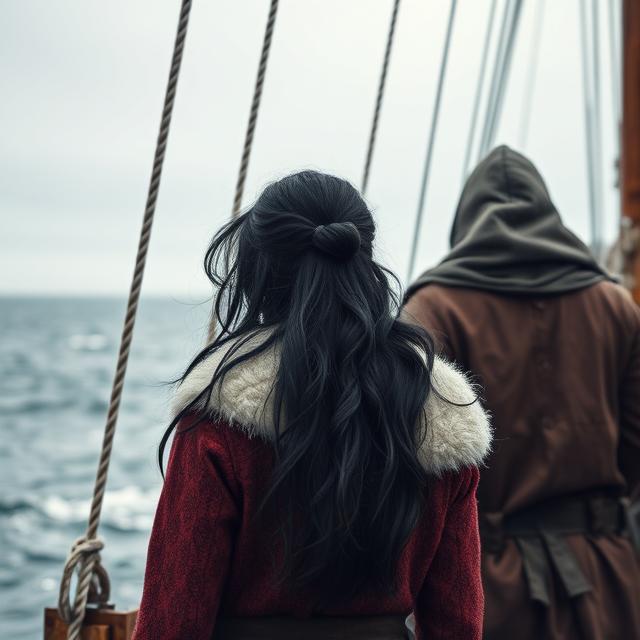You rode to Margaret, and she was waiting at the meeting point you had agreed on—a lonely stretch of birch and stone overlooking the misted shore, her figure half-shrouded in dawnlight, as if she had been standing there for hours, waiting not just for you, but for the fate that would follow in your wake.
The voyage north is long and cruel.
The sea, once a cradle of merchants and travelers, feels now like a graveyard—endless gray swells rolling under skies the color of lead. The salt wind claws at your face, freezing the tears that no longer fall. The men avoid your gaze; they feel the weight you carry, and though they whisper prayers to their northern gods, none dare speak your name aloud.
Margaret stands at the prow, her cloak whipping like a black banner against the spray. She rarely looks at you now. Sometimes, in the trembling lantern light, her face seems carved from the same pale stone as the cliffs that rise when Sweden’s coast comes into view. Between you stretches a silence deeper than the sea itself—an unspoken grief, an invisible wall of ash and memory.


When at last the ship moors in the harbor of Aldebryn, you breathe air thick with salt and pine, with the scent of tar and burning pitch from the dockyards. The city looms above the bay—a fortress of timber and granite built upon ancient cliffs, its roofs glinting with copper and frost. Ships creak in the harbor below like restless beasts.
Margaret’s family receives you under banners of blue and silver. Her uncle, Duke Jorund, greets you with the cold courtesy of a man weighing risk against duty. He offers you shelter within the walls, but not welcome. You are an exile now, a lord without realm or crown, a fugitive bearing both love and danger.
Aldebryn becomes your prison of comfort.
You dwell in rooms overlooking the sea, where the wind never ceases its mournful cry. Margaret tends to you at first, her kindness deliberate, her smile brittle but sincere. She speaks of rebuilding, of peace, of living quietly beneath foreign stars. But her words sound distant, as though she no longer believes them herself.
You try to believe. You try to become what exile demands—a shadow of what you were, a man content with breath alone. Yet every night, as the waves batter the cliffs, dreams come.
You dream of a black crow, its wings vast as stormclouds, its eyes bright with cruel intelligence. It circles above a field of snow where crimson banners lie torn and bloodied. Beneath its talons lie your father’s sword and your mother’s ring, buried half in frost. When you reach to grasp them, the crow opens its beak—and from within pours not sound, but a tide of darkness that swallows you whole.

You wake gasping, sweat cold on your skin, the echo of wings still beating in your chest.
Margaret stirs beside you sometimes, whispering your name, asking what you saw. You lie, saying nothing, staring into the dark. The dreams are warnings—you know that much. Warnings, or promises.
Then one morning, as frost creeps across the windowpanes, a courier arrives from the south. His journey has nearly killed him; his horse collapses before he can speak. But the letter he bears bears an imperial seal.
You recognize it at once.
Claudius.
Your hands shake as you break the wax. The parchment smells faintly of myrrh and smoke—an imperial scent. The message is short, but its meaning cuts deeper than any blade.
“To those who harbor the outlaw styling himself the Heir of Moravice,
Let it be known that His Imperial Majesty recognizes and supports the rightful Duke Hyacint Drevanyn as sovereign and ally. Any who give refuge to the pretender shall share his fate.“
You read the words again and again, though they change nothing. Claudius—your emperor, your supposed patron—has chosen his side. You are no longer a claimant; you are a criminal.
Margaret finds you still holding the letter hours later.
Her voice trembles when she speaks. “He knows. He knows you’re alive.”
You nod, unable to answer.
She steps closer, her hands cold on your shoulders. “Then we must flee again. We’ll go north, deeper inland. My uncle will understand—”
You pull away. “No. He’ll cast us out. You’ve seen the fear in his eyes. He’ll not risk Claudius’s wrath for my sake.”
Her lips tighten, but she says nothing more.
From that day on, the air in Aldebryn grows heavy.
You sense it in the glances of servants, in the way guards linger near the gates, in how Margaret’s kin begin to avoid your company. You dine alone now, your meals growing colder each night. Even the sea seems to turn its back, gray and unkind beneath lowering skies.
The crow returns in your sleep.
It lands upon the parapet of Aldebryn’s highest tower and speaks in a voice not of man or beast but of storm and fire.
“You are marked, son of ashes. Claudius remembers his debts. He will collect them in blood.”
You wake with a cry, the echo still ringing in your skull.
Margaret rushes to you, her nightgown pale as the moon, fear in her eyes. “Was it the dream again?”
You cannot answer. You only stare out the window, where the sea churns beneath the dawn.
If Claudius’s assassins come, you will not see them until it is too late.
Weeks pass in uneasy silence. Margaret grows thinner, her laughter rare. You speak little, for each word feels like kindling thrown upon a dying fire.
Some nights, you walk the cliffs alone, staring into the foam below and wondering if death might be kinder than waiting. Other nights, you sit by the hearth, polishing your sword, though you know no steel can save you from what hunts in shadows.
Then comes the whisper—from a merchant loyal to your cause, smuggled across the sea.
Claudius has dispatched envoys to the northern courts, carrying letters sealed in black wax. Within them, it is said, are the names of those who sheltered the Moravice heir. One name is spoken in secret at Aldebryn’s taverns now: Margaret.
You confront her in the hall at dusk, when the windows bleed gold.
“What do we do now?” you ask, your voice low.
She shakes her head. “We stay here.”
But her eyes flicker—fear, doubt, something you cannot name—and the crow within you stirs again.
Silence stretches between you like a drawn blade. You want to reach for her, to tell her that love is still possible in exile, that hope still burns, faint but alive. Yet the words die on your tongue. What right have you to offer her anything but danger?
That night, sleep eludes you. You sit by the window until dawn, watching snow gather on the battlements. The thought circles in your mind like a wolf around a wounded deer: If it is you Claudius wants, perhaps the only way to save her is to give yourself up.
You imagine it—the cold halls of the imperial palace, the chains, the quiet dignity of surrender. Perhaps, if you go willingly, Claudius will spare her. Perhaps he will honor the remnants of your bloodline enough to let her live.
But another voice whispers within—the voice that bears your father’s defiance, your mother’s courage. If you die, he wins. If you surrender, your name dies with you.
By the next evening, your decision feels like iron pressed to your chest. The air in Aldebryn grows tense, the servants whispering of strangers at the docks—men asking questions in Slavic accent.
Margaret finds you in the armory, fastening your cloak.
“Where are you going?” she asks, voice tight with fear.
You meet her eyes, and for a moment, the weight of all you have lost presses down. “Somewhere they cannot follow.”
Her lips part to protest, but you raise a hand. “If I stay, they’ll find us both. Claudius won’t rest while I live. I won’t see you die because of me.”
Tears gather in her eyes. “And if they kill you?”
You smile faintly. “Then perhaps they’ll forget your name.”
The silence that follows is long and heavy, filled with the sound of waves breaking below the cliffs.
She steps forward, trembling, her hands clutching your cloak. “Don’t go,” she whispers. “Please.”
You touch her face once—gently, as if to memorize it—and then turn away.
Outside, the crows circle above the sea, their cries sharp against the wind—omens of endings yet to come. Two paths stand before you, clear and cruel as fate itself:
…..
You decide to abandon Margaret on the morrow, taking your retinue into the wilderness beyond Aldebryn to hide, knowing that it likely means your death—but her safety.
….
You decide to stay, resolute, determined to foresee Claudius’s assassins before they strike, to fight the inevitable shadow with whatever time remains.

One Comment